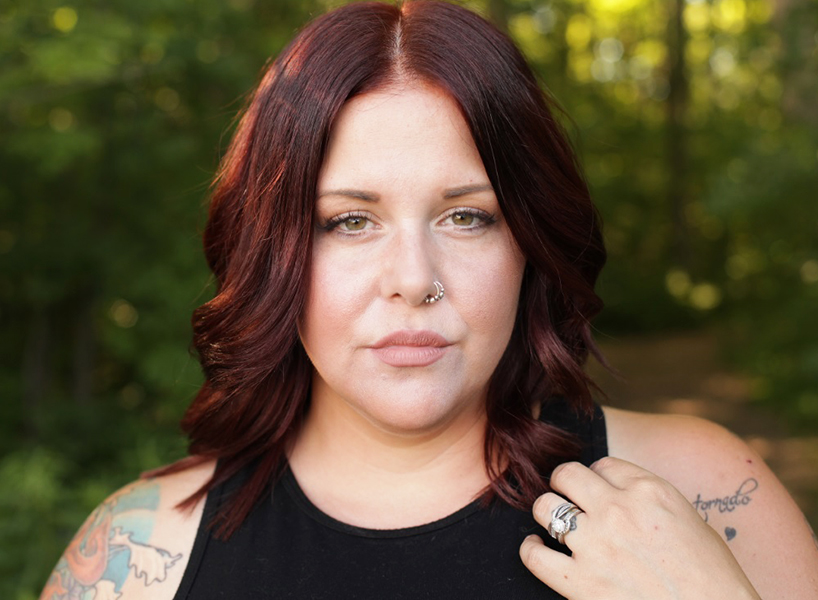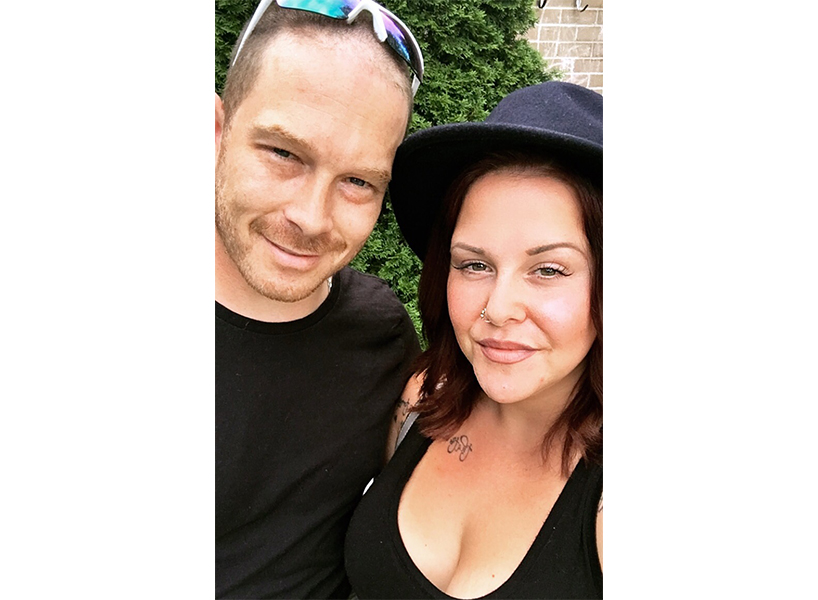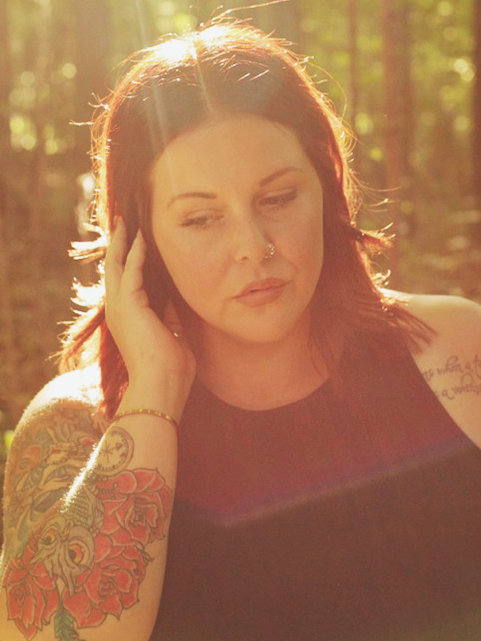“After Being Raped, I Needed to Learn How to Have Sex Again”
*Trigger warning* this story contains mentions of sexual assault


On a cold morning last November, my husband and I were snuggled in bed, spooning. The house was quiet, our three sons still snoring peacefully in their own beds. As we began to stir, my husband’s lips started searching for the soft spot on my neck, the one between my ear and the curve of my shoulder that always sent shivers ricocheting through my whole body. But this time, I flinched. Silent alarms went off in my mind, and I automatically curled my body into myself—and away from him. Even as the onslaught of fear and shame lit every nerve in my body on fire, I dared a glance behind me. My husband lay frozen, his hands now tucked away and the emotions he tried so very hard to hide—a mix of guilt, hurt and empathy—clear in his eyes. There was even a pinch of anger, though that, I knew, wasn’t intended for me. It was aimed at the man who had violently raped me.
“I was reasonably sure he was neither a catfish nor a murderer”
My husband and I had never been a “traditional” couple. We had kids and got married before most of our friends. We love and argue passionately. And, we are polyamorous. Being poly gives us the opportunity to explore relationships, not only sexually but also emotionally. We get to meet many different people, who fit into our lives like missing jigsaw pieces of a much larger puzzle. The five years since we adopted this lifestyle have been the happiest in our 11-year relationship.
So, given the nature of my marriage, it wasn’t strange when I arranged to go on a date with another man on a Saturday night in September 2017. I met him through an online dating app for polyamorous people in non-monogamous relationships. I had chatted with him for a week or so, asked all the right questions and was reasonably sure he was neither a catfish nor a murderer. He seemed like just another normal guy. So after jotting down the details of the restaurant we’d arranged to meet at and what time I would be home, I kissed my husband goodbye and made my way to what I assumed would be a nice dinner with a nice man.
However romantic the idea of meeting a potential new partner is, I’ve always had a very strict set of rules when it came to first encounters. We need to meet in a well-lit, public place with lots of people around, and these meetings must take place early in the evening. That night I followed my rules to a tee. What I hadn’t accounted for was the fact that this seemingly normal guy was actually a predator, and knew how to circumvent all of my precautions.
When he met me at the restaurant, I suggested we sit at the bar. I was driving, so it wasn’t because I wanted to drink—it was because I always liked to have someone who I can signal in case my date started to give me the creeps. That didn’t work for him, so he kindly yet firmly insisted we sit in a dark, corner booth far enough away I was no longer in the bartender’s line of sight. For the next hour he continued to buy drink after drink for me, no matter how much I politely protested. He would grab at my hands and pull them possessively across the table, like a dog tugging on a toy. He would make subtle comments about his strength and sexual prowess, even though I hadn’t asked. He made sure to mention he was a champion boxer, and knew how to hit. Looking back now, I know that this was deliberate. He was building a layer of fear. Not enough to make me run screaming, but enough for me to know I shouldn’t do anything to make him upset.
“Should I scream? Should I get out and run?”
When I had come up with a plausible enough excuse to end the date early and we left the restaurant together, he insisted on driving me to my car. I had parked two blocks away, so I assured him it was a quick walk, but instead of saying goodnight he aggressively took me by the arm, and shoved me into the front seat of his vehicle.
In shock, I sat frozen for the next few moments, not really grasping what was coming. What do I do? Should I get out and run? Am I overreacting? I thought. But I didn’t have the opportunity to figure out what to do next. Within seconds of getting in the car on the driver’s side, he had hopped over the console, slammed my seat back into a reclining position and flattened his body—all six feet and close to 200 pounds of it—on top of mine. I kept saying, “No,” but he didn’t listen.
For what felt like hours, but was probably only 30 minutes, I was sexually assaulted in almost every way you could think of. As he methodically had his way with my limp body, he bounced back and forth between whispering sweet nothings to muttering detailed threats of violence if I even thought about screaming. I didn’t scream. As I would come to learn later, when you are faced with life-or-death situations, your mind will give you two options: fight or flight. But when you are in a situation where both fight and flight could get you killed, then you have only one choice: survive.
I went home that night with chunks of my hair ripped out, scratches and bruises on my face and blood in my jeans. All I wanted was to be clean, safe and untouched. Needless to say, there would be no more secondary partners, male or female, for the foreseeable future.

“After being raped, I felt like I had become an entirely different person”
If I’m being honest, after the assault, all chemistry in the bedroom was dead. I was lucky to even leave the house. Before I was raped, I was ballsy, loud, protective and strong. After, I refused any invitation to social situations, because I would rather be a hermit than take the chance of running into my rapist. I used to love going for runs at 5 a.m., when the world was quiet and the road was empty. It was my only form of therapy, but after the attack, I couldn’t do it anymore—my fear of the dark and being alone was so visceral it formed a chain around my legs. I lost so many important parts of who I was. I felt like I had become an entirely different person.
Not long after, I did start seeing a therapist for what I now know were the beginnings of PTSD. She helped me to understand why I would wake in the middle of the night at any slight noise, my heart racing and my mind in full panic. With her help, I began to edge, slowly and carefully, back into my life before the assault.
But there was one thing she couldn’t help me recover: sex. I couldn’t bear the thought of it, even of healthy, consensual sex with a trusted partner. Any touch, no matter how small, sent me crawling right out of my skin. But when I told her that I need to recover my sex life, the best advice she could give me was, “Give it time.”
“We’re never given the tools to repair our relationship with sex”
I couldn’t quite articulate why it was so important for me to reclaim my sex life. But when my therapist couldn’t help me feel safe having sex again, I spent months searching through online forums, reading a handful of outdated self-help books and even attending some of the horribly underfunded government-provided counselling programs for survivors of sexual assault. Each of these resources lightly grazed the surface of what was now deeply-set trauma and discussed how to deal with daily triggers, but absolutely none of them even touched on the sexual health of victims after the fact. I soon realized that my healing would have to be self-directed.
I sought out quiet, safe spaces where I could be near people but not in direct contact with them: the library, yoga class, the park. I observed that most interactions I saw were consensual and harmless, and I allowed myself to feel content when thinking about experiencing it for myself again. In the moments when I could summon just the right amount of courage, I would be the one to initiate a hug, a kiss, a lingering touch.
The one thing I did know from all of my research was that survivors of rape are at a higher risk of experiencing sexual violence again. This happens for a host of reasons, including shame, depleted self-worth and lack of support in recovery. But I believe it’s also because we’re never given the tools to repair our relationship with sex, and learn how to separate the good from the bad. That means when we do find ourselves in an intimate situation, we often let it happen to us, not with us.

“I needed some sense of autonomy”
Recovery is a slow process. I’ve had to do a considerable amount of internal work—everything from journaling to meditation to talking to people I trust about the rape—to accept that I did not ask for what happened to me and learn that I can forgive myself for being what I perceived as weak and fragile. I needed to allow myself the time and space to rekindle my sexual desires, and untangle those from what happened to my body without my permission. But eventually, I was able to recognize that it wasn’t wrong to want to touch or be touched, even if my mind was still sometimes clouded with fear.
And most importantly, I finally understood why it was so essential for me to recover my sex life after being raped.
One big part of that was, very simply, that I love sex. Like, really love it, and everything that comes with it. A gentle caress on my skin, a playful smack on my ass, a naughty tug of my hair, a deep endless kiss. It was an integral part of who I was with my partners, especially my husband. Sure I could say it had to do with female empowerment and sexual freedom, but the simple, honest truth is, sex made me feel happy. And who doesn’t want happiness?
But there was also a large part of me that needed some sense of autonomy. A predator had violated me in a brutal, disturbing, all-too-common way and now, it felt as if my body didn’t belong to me anymore. That feeling—that I didn’t own the vessel that carried around my soul for 30-odd years—was one of the most upsetting parts of being sexually assaulted.
Despite all this work, I wouldn’t say I’m “back to normal.” I’m halfway there, though. My husband and I are moving slowly back to the comfortable passion we once had. But for the first time in the year since my rapist took something he had no right or permission to, I finally feel in control of what happens to my body.
I have taken my sex life back—and I have no intention of losing custody of it again.
Related:
I Was Raped. Then, My Rapist Tweeted About It
We Love A Summer Music Festival—But Are They Really Safe Spaces for Women?
Shitty Men, CanLit and the Legal Ramifications of the Whisper Network









